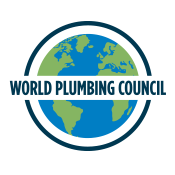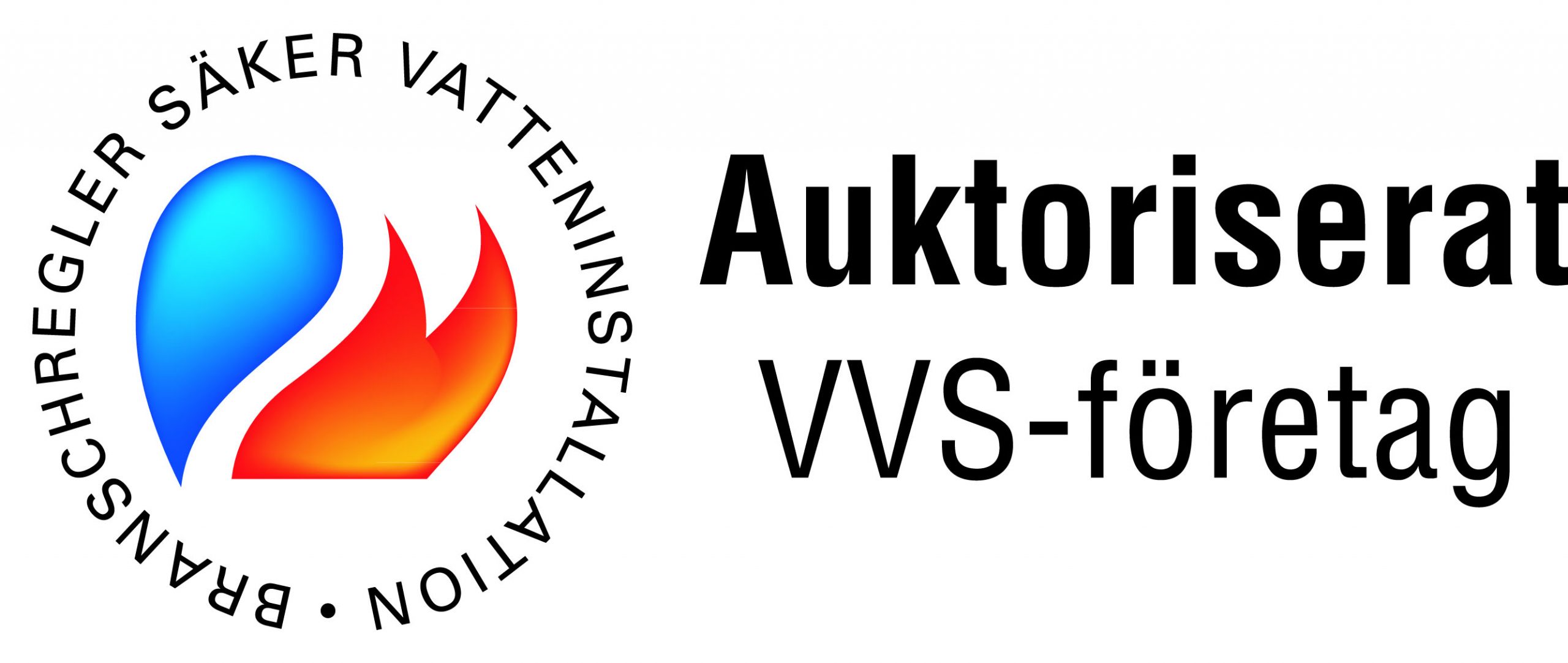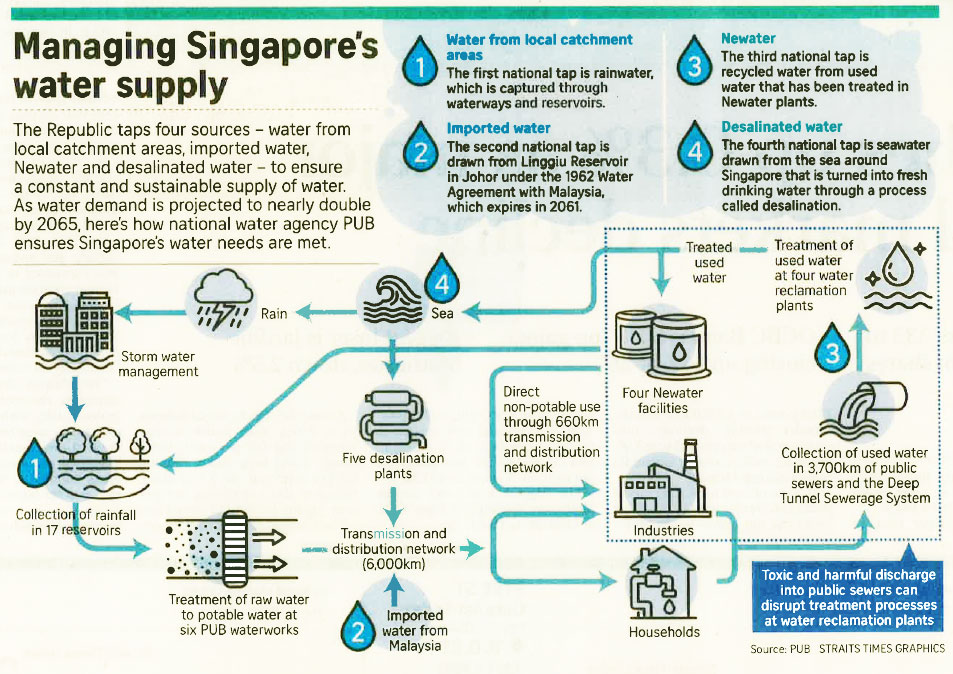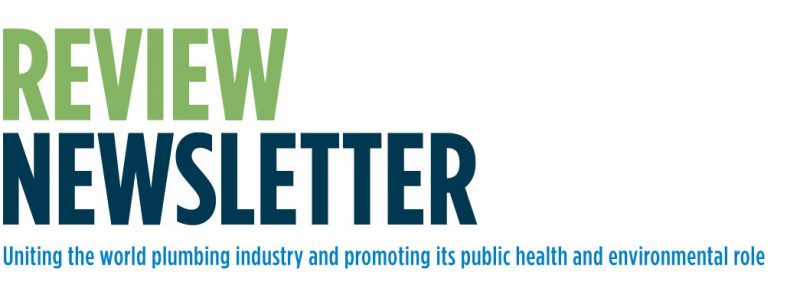
NOVEMBER 2025 | Chair’s Message
 As we enter the last quarter of 2025, it’s a fitting time to reflect on the progress our global plumbing community has made. Around the world, our members continue to demonstrate the essential role plumbing plays in safeguarding public health, advancing sustainability, and ensuring access to safe water and sanitation. The World Plumbing Council remains committed to fostering collaboration, innovation, and professional growth across our industry — and none of this would be possible without the continued engagement of our members and partners.
As we enter the last quarter of 2025, it’s a fitting time to reflect on the progress our global plumbing community has made. Around the world, our members continue to demonstrate the essential role plumbing plays in safeguarding public health, advancing sustainability, and ensuring access to safe water and sanitation. The World Plumbing Council remains committed to fostering collaboration, innovation, and professional growth across our industry — and none of this would be possible without the continued engagement of our members and partners.
Looking ahead, I’m pleased to invite you to register for the 14th World Plumbing Conference (WPC 2026), to be held June 23-25, 2026, at the NEC Birmingham in the United Kingdom, coinciding with the InstallerSHOW. This landmark event will focus on global solutions to worldwide plumbing challenges and will explore key themes shaping our industry’s future: skills, sustainability, supply and conservation, and safety. With registration now open, I encourage all members and stakeholders to secure their place early and be part of this truly global gathering. Register at wpc2026.com.
Speaking of the World Plumbing Conference, the WPC is now accepting applications from member countries interested in hosting the 2029 conference. Hosting this event provides a unique opportunity to showcase your nation’s leadership in plumbing innovation, engage with international experts, and contribute to shaping the global agenda for years to come.
We are also excited to announce that the 2025 WPC Scholarship Program is now open for submissions. These scholarships provide valuable opportunities for individuals committed to advancing plumbing knowledge, developing new skills, and sharing best practices that improve lives through better plumbing worldwide. I strongly encourage eligible applicants to apply and take advantage of this initiative — it’s a fantastic opportunity.
As we approach the new year, a reminder that membership dues for 2026 will soon be due. On behalf of the WPC Executive Board, I extend my sincere thanks to all our members for your ongoing support and participation. Your commitment sustains the council’s mission to promote the plumbing industry’s critical role in protecting health and the environment on a global scale.
On the note of membership, I’d like to welcome LIXIL to the WPC organization.
Thank you for another productive and inspiring year. I look forward to what we will accomplish together in 2026 and beyond.
Dave Viola
Chair, World Plumbing Council
IN THIS ISSUE:
Early Bird Savings for 2026 World Plumbing Conference
Fire Protection: The Industry’s Urgent Need For A National Model
The Swedish Model: How National Standards Like Säker Vatten Build Global Trust In Plumbing
BPEC Twins Its Toilets To Help Tackle Global Sanitation Crisis
Australian Apprentices Shine At UA International Apprentice Competition In Ann Arbor, USA
Philippines: NAMPAP 90Th Year Of Sustaining Leadership And Excellence
The Real Price Of A Flush: Why Mumbai Must Rethink Water Use
Queensland Plumbing And Gas Industry Awards Celebrates 25Th Year Of Dedication And Innovation
Singapore Strengthens Industrial Wastewater Management
Call For Submissions – World Plumbing Council 2025 Scholarship
Early Bird Savings for 2026 World Plumbing Conference
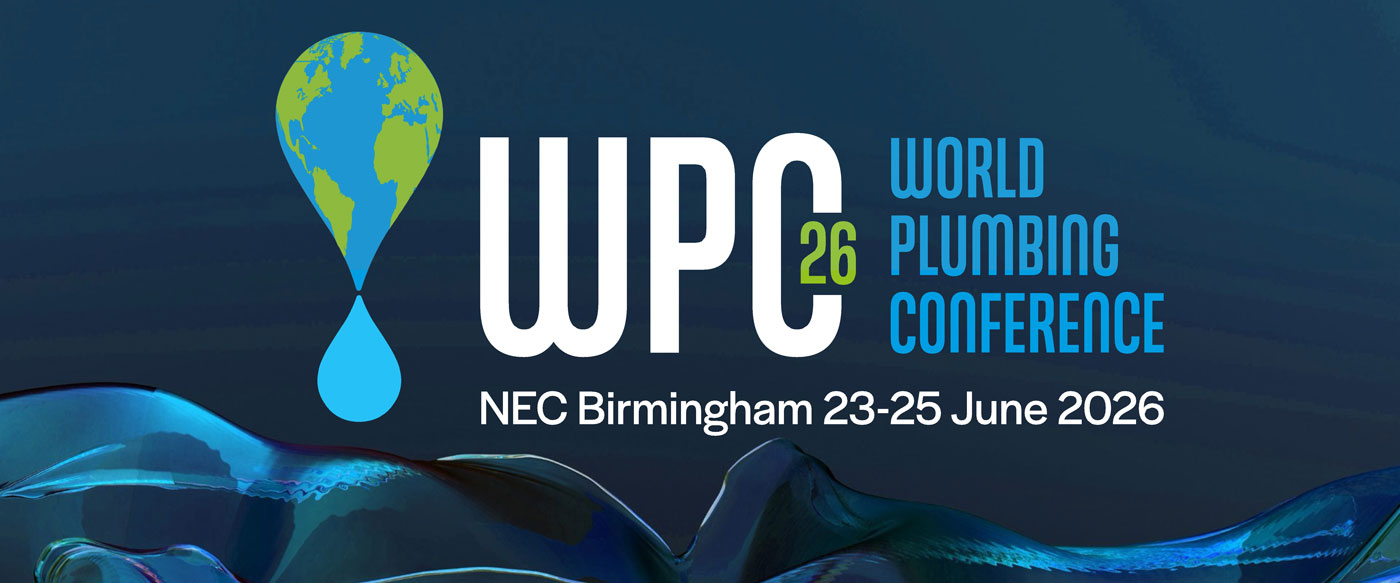
Join the global plumbing and heating community at the World Plumbing Conference 2026, taking place 23–25 June 2026 at the NEC Birmingham, alongside InstallerSHOW.
Hosted by the World Plumbing Council and the Chartered Institute of Plumbing and Heating Engineering (CIPHE), this international event will gather over 500 delegates for three days of expert insights, innovation, and networking under the theme “Worldwide Problems – Global Solutions.”
Early Bird Offer: Register now and secure your three-day delegate pass for just £350+VAT — available until 31 December 2025. Discounts are also available for CIPHE members and international group bookings (50+).
This year’s conference features a variety of knowledge sessions designed to address global challenges and drive innovative solutions in plumbing:
- Skills Development: Explore essential training and workforce development strategies.
- Supply & Conservation: Engage in discussions on sustainable practices for resource conservation.
- Sustainability: Discover the latest trends and solutions in sustainable plumbing.
- Safeguarding the Public: Learn about the impact of poor plumbing on public health, water associated problems such as Legionnaires’ disease and scalding and non-compliant products.
Be part of an exclusive opportunity to learn, connect, and shape the future of plumbing with industry visionaries and professionals from around the globe.
Register today at wpc2026.com/
Fire Protection: The Industry’s Urgent Need for a National Model
![]() Submitted by Joe Smith, Chief Executive Officer at the National Fire Industry Association of Australia (NFIA)
Submitted by Joe Smith, Chief Executive Officer at the National Fire Industry Association of Australia (NFIA)
A niche but integral part of our built environment, fire protection systems save lives and buildings. Fire protection is the first line of defence against serious and deadly fires. Correctly installed and maintained systems can slow or stop a fire from spreading, protecting inhabitants of the building and assisting firefighters.
Licensing requirements for the fire protection industry are inconsistent across the nation and unfortunately, there have been a number of fire-related tragedies that should act as a call to action for Australian governments to address this immediately.
In 2000, the Childers Palace Backpackers Hostel fire resulted in the deaths of 15 people after the fire alarms in the building had been disabled. More recently, the coroner’s findings on the death of a 3-year-old child in a Victorian fire in 2020 were released. Occupants were unable to utilise the fire hose reel when fire broke out in a unit complex, even though the system had recently undergone maintenance.
The report alarmingly also cites that between 1 January 2010 and 30 September 2022, there were 13 fire-related deaths from 11 incidents where there was evidence that the fire occurred in public housing and only six of these properties had functioning fire alarms.
There were several recommendations in this report, one of them being that licenses should be required for technicians who perform inspections and testing of fire systems, so that servicing is performed to the requisite standard. This recommendation was in line with the recommendations published in the Building Confidence Report (BCR) and demonstrates that Australia’s existing licensing frameworks are insufficient to protect the built environment against the threat of fire.
In 2018, Peter Shergold and Bronwyn Weir published the BCR to improve the effectiveness of compliance and enforcement systems for the building and construction industry across Australia. On 18 July 2019 the Building Ministers Forum “agreed to a national approach to the implementation of the Building Confidence Report” and all jurisdictions supported “a national framework to address the issues identified in the Shergold Weir Building Confidence Report.” Despite commitment from all jurisdictions, not all of the recommendations have been implemented.
Recommendations 1 & 2 of the BCR identify that while fire safety systems are a critical component of commercial buildings, most states and territories do not have a requirement to register the practitioners who have expertise in fire safety system design, installation or maintenance.
Recommendation 19 addresses inspection and certification of fire safety system installation. Developing from Recommendation 1, it recommends mandatory implementation of certification of the testing and commissioning of fire safety systems.
In addition to the threat on public safety, the implications of Australia not adopting a national model for fire protection makes Automatic Mutual Recognition (AMR) difficult. AMR has struggled since its introduction, with these discrepancies exacerbating the issues of skills shortage.
It is important to acknowledge that along with these recommendations being adopted and implemented, it is imperative for each jurisdiction to ensure there is a regulatory body to adequately govern these licensing schemes. A “quick fix” of a licensing framework without an inspection requirement to ensure practitioners are indeed registered will hinder the industry’s progress.
NFIA believes that an appropriate regulatory framework should protect community and property safety, provide adequate consumer protection, recognise and accommodate industry practice and standards, require practitioner registration, and be linked to the national training package framework.
There is reason for optimism. The New South Wales Government is looking at introducing a comprehensive licensing framework for all areas of fire protection under the Building Bill and is engaged in consultation with industry through the process. Western Australia has introduced a licensing framework for fire systems designers under its registration of engineers scheme. The state is reviewing the regulations regarding the installation of fire protection systems, and the NFIA and fire protection industry are strongly pushing for its progress.
The NFIA will continue to advocate for the betterment of the industry. While some jurisdictions are taking steps forward, we must continue to prioritise a specialised fire protection industry with government licensing of qualified and specially training practitioners.
For more information on the National Fire Industry Association, go to the website
The Swedish Model: How National Standards Like Säker Vatten Build Global Trust in Plumbing
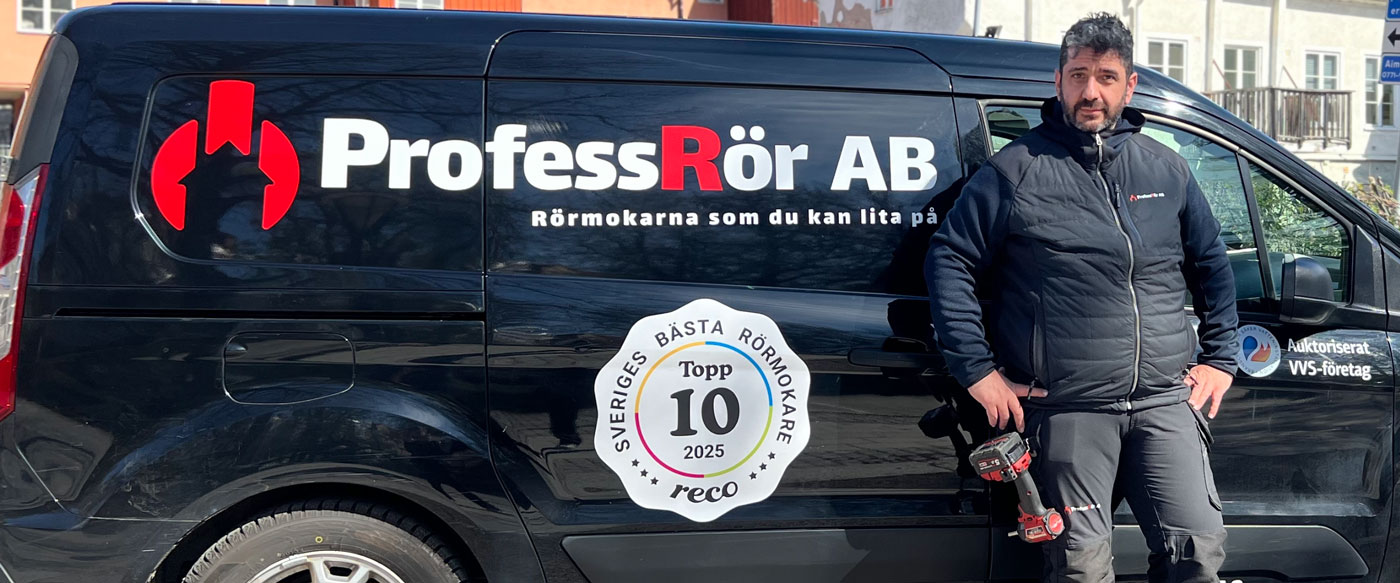
Submitted by ProfessRör AB – Knivsta, Sweden
Lessons from a family-run plumbing company on certification, transparency, and local responsibility that foster lasting trust.
In Sweden, plumbing is more than a trade, it’s a culture of responsibility that begins in every home and extends through every connection in the system. Water is one of life’s most essential resources, yet its safe and reliable delivery depends on strong systems, clear standards, and skilled professionals.
A national approach that combines rigorous certification, transparent pricing, and a strong sense of local responsibility has helped Sweden build something rare a lasting culture of trust that the global plumbing community can learn from.
At the heart of this approach is Säker Vatten, Sweden’s nationally recognized certification framework. More than just a label, Säker Vatten represents a complete code of practice that connects qualified installers with documented procedures and strict quality control. This structure ensures that homeowners, property managers, and institutions know exactly who they are hiring and what level of work they can expect. The results are fewer failures, improved safety, and reduced long-term costs, outcomes that resonate worldwide.
The Role of Small, Family Run Businesses
Small, family run companies form the backbone of Sweden’s plumbing industry. While large contractors handle major infrastructure projects, most plumbing work happens inside homes and smaller buildings, carried out by local professionals who serve their communities every day. These are the people who show up at midnight when a pipe bursts, or who help families transition to more energy efficient heating systems.
When these small businesses operate within a clear national framework like Säker Vatten, the result is an industry built on accountability, professionalism, and trust.
Beyond Rules: A Culture of Trust
The Swedish model is not just about regulations, it’s about a mindset. Transparent pricing removes uncertainty and builds goodwill. Certification guarantees competence and safety. Local presence ensures fast response times and deep knowledge of the area’s needs. Together, these elements make trust measurable and repeatable rather than something left to chance.
Lessons for the Global Plumbing Industry
For countries looking to strengthen public confidence in plumbing, the Swedish model offers a clear roadmap:
- Establish transparent standards. Create guidelines that are clear, enforceable, and focused on safety and quality.
- Make certification meaningful. Ensure that it’s practical, accessible, and based on measurable performance.
- Empower local professionals. Give small businesses the support and structure they need to succeed within their communities.
Policymakers should collaborate closely with trade organizations to keep certification systems relevant and effective. At the same time, plumbing companies should embrace transparency, publishing clear service details, response times, and genuine customer reviews.
Trust as a Strategic Asset
As infrastructure demands grow and climate challenges reshape how we manage water and energy, trust is becoming a strategic asset. By combining national standards with local accountability, Sweden demonstrates a practical path toward safer, more sustainable plumbing systems, one installation at a time.
BPEC Twins its Toilets to Help Tackle Global Sanitation Crisis
![]() Submitted by BPEC – United Kingdom
Submitted by BPEC – United Kingdom
BPEC is proud to announce its support for Toilet Twinning, an initiative run by Tearfund that helps transform lives by funding safe toilets, clean water and hygiene education in some of the world’s poorest communities.
Following a proposal from Mark Antrobus and with unanimous support from the other BPEC Charity trustees, all toilets at our Derby offices have now been officially “twinned.” Each facility is paired with a toilet in one of six countries: Malawi, Nepal, Nigeria, Uganda, Zambia and Zimbabwe. Certificates are now displayed across our offices for staff and visitors to see.
Unsafe sanitation and dirty drinking water remain a deadly global issue, causing 1.4 million deaths each year, including more than 1,000 children under the age of 5 every single day. Toilet Twinning tackles this through community-led hygiene workshops and by helping families source local materials to build their own sustainable toilets. For every £1 donated, 84p goes directly to life-changing projects, while just 16p covers fundraising costs.
BPEC CEO Neil Collishaw said, “Projects like this make me really proud to work at BPEC. As a charity, one of our core objectives is to invest in initiatives that use plumbing knowledge and skills to improve lives both here in the UK and overseas. Toilet Twinning is a simple but powerful way to make a difference, and we’re delighted to play our part.”
By supporting Toilet Twinning, BPEC is not only helping to restore dignity and improve health for families.
Find out more about Toilet Twinning at toilettwinning.org/transparency.
Australian Apprentices Shine at UA International Apprentice Competition in Ann Arbor, USA
Submitted by: The Plumbing Industry Climate Action Centre (PICAC) – Australia
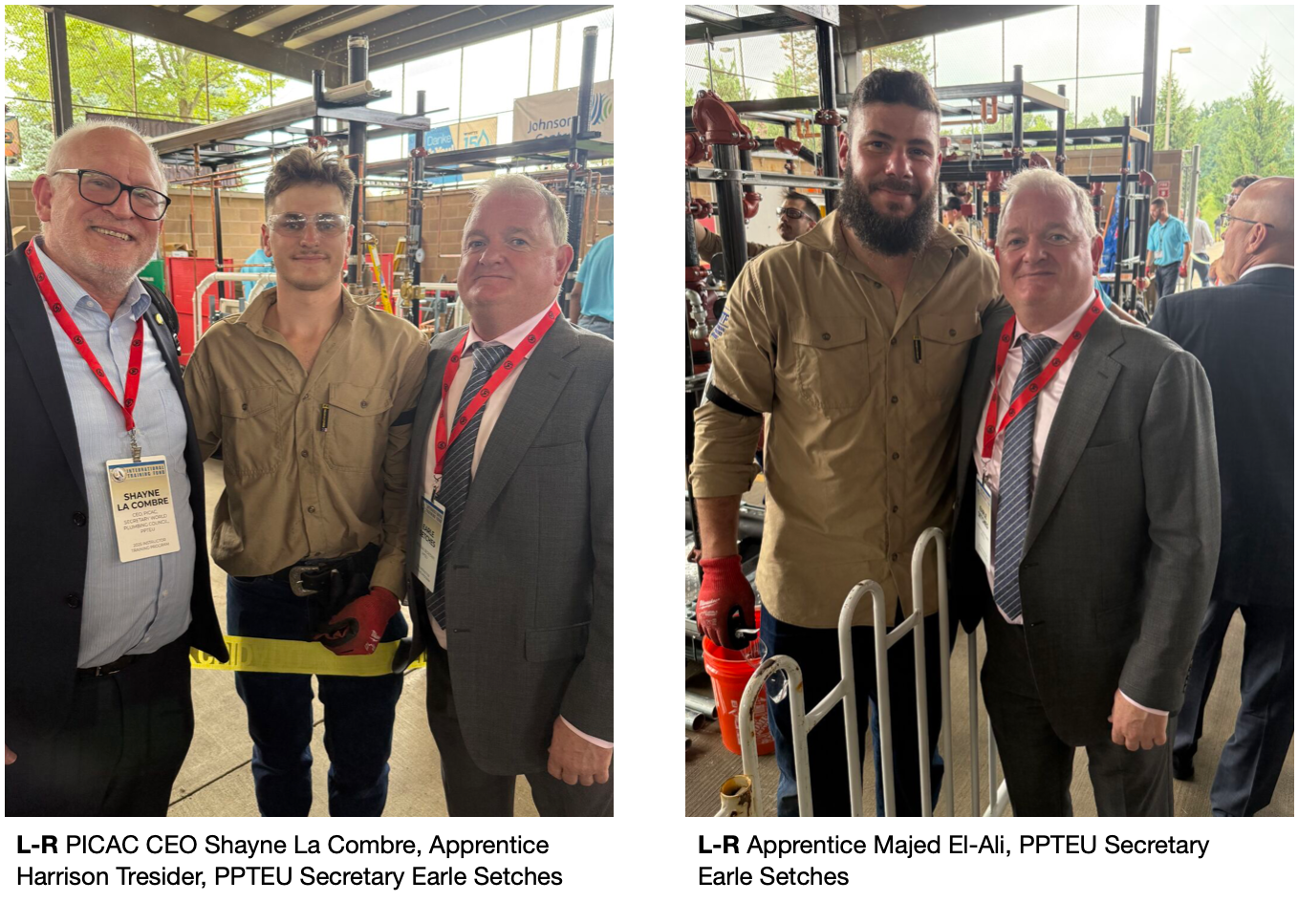 PICAC is proud to celebrate the outstanding achievements of Harrison Tresider and Majed El-Ali, who recently represented Australia at the United Association (UA) International Apprentice Skills Contest in August in the United States.
PICAC is proud to celebrate the outstanding achievements of Harrison Tresider and Majed El-Ali, who recently represented Australia at the United Association (UA) International Apprentice Skills Contest in August in the United States.
Over an intensive five-day competition, the event brought together top apprentices from the United States, Canada, Ireland, and Australia, each showcasing technical expertise, precision, and professionalism across a range of disciplines. Harrison, a Queensland plumbing apprentice employed by Beavis & Bartels, and Majed, a Victorian sprinkler fitter apprentice graduate employed by Airmaster, demonstrated exceptional skill, determination, and composure throughout the contest, proudly representing their trades, their employers, and Australia on the global stage.
Their performance reflected the high standards of training delivered through PICAC and its industry partners, as well as the professionalism and pride that define Australia’s trade apprentices. Through their hard work and dedication, Harrison and Majed earned the respect and admiration of their international peers, setting an inspiring example for the next generation of skilled professionals.
PICAC extends its warmest congratulations to Harrison and Majed for their achievements, their professionalism, and the way they represented Australia and our industry with distinction.
Philippines: NAMPAP 90th Year of Sustaining Leadership and Excellence
![]() Submitted by Allan Dumalay, NAMPAP, Inc., WPC Individual Member – Philippines
Submitted by Allan Dumalay, NAMPAP, Inc., WPC Individual Member – Philippines
The National Master Plumbers Association of the Philippines (NAMPAP) will celebrate its 90th Foundation Anniversary and National Convention in Boracay, Nov. 22-23.
Boracay, one of the Philippines’ most popular tourist islands, was once called a “cesspool” by former President Rodrigo Duterte. In the plumbing industry, a cesspool is defined as an underground container for temporary storage of sewage. The word can also refer to a disgusting or corrupt place.
The Philippines is embroiled in a flood-control controversy involving billions of pesos allocated for flood-control initiatives amid reports of “ghost projects,” while people continue to lose their lives and property to flooding and crop destruction.
What can an ordinary master plumber do about this mess? The National Convention is expected to discuss the professional code of ethics, government civil service, and — timely — the environmental impact technicalities that could align with the United Nations Sustainable Development Goals; specifically the Goal 6: Clean Water and Sanitation, and Goal 14: Life Below Water. The event will also feature displays and presentations of the latest plumbing industry products and technologies.
Everyone is invited for this annual event to network with colleagues in the plumbing industry and enjoy the natural spectacles of the islands. One NAMPAP!
The Real Price of a Flush: Why Mumbai Must Rethink Water Use
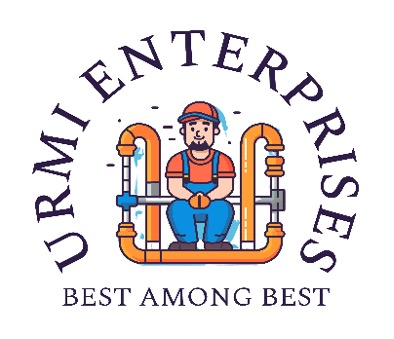 Submitted by Nayan Mohanty, URMI Enterprises – India
Submitted by Nayan Mohanty, URMI Enterprises – India
A friend recently shared a striking fact with me: in the United States, a single flush of a toilet is calculated to cost nearly ₹21 when measured in terms of water consumption. At first this seemed like trivia, but the more I thought about it, the more it felt like a warning. If developed nations with abundant resources are valuing water so highly, what does it say about us in India — particularly in Mumbai, a city of more than 20 million people — where water is often treated as limitless and free?
I have lived in Mumbai for the past 25 years and worked professionally in the construction and MEP services sector. In this time, I have seen both sides of the city’s water story. Every summer, residents face severe cuts as lakes dry up and tankers make desperate rounds in neighborhoods. Yet, in the monsoons, we watch water tanks overflow, taps leak unchecked, and flushing systems guzzle liters without a thought. We install sewage treatment plants and rainwater harvesting pits, but the one area we consistently ignore is the most obvious: saving domestic drinking water.
This is not a small oversight. Our water infrastructure is designed to meet today’s demand, not tomorrow’s growth. If households across Mumbai could reduce wastage by even 15 or 20%, the city would create a surplus large enough to soften summer shortages, reduce dependence on expensive tankers, and ease the strain on already overstretched reservoirs.
The truth is, much of the problem lies in how we consume water at home. A single leaking tap can waste thousands of liters each year. Old flush tanks drain 10 to 12 liters in one go, where modern dual systems use half that. Overhead tanks overflow for hours because nobody bothers to fit or maintain an automatic float. And perhaps the most telling flaw of all: water is not individually metered in most homes. Bills are divided equally among flats, so there is no accountability. A family of two pays the same as a family of 10. The result is predictable — people treat water as if it comes free.
This is where Mumbai needs a cultural shift, and it begins with individual household metering. Around the world, this is standard practice. In Singapore, not a single drop is unaccounted for, and recycled sewage water is purified to drinking standards under the NEWater project. In Australia, households are billed according to usage and punished for excess. Even in the United States, where resources are vast, every home has a meter. The fact that they can put a rupee value to a single flush is because they track every liter.
India lags behind. Our cities may boast modern infrastructure, but our mindset remains stuck in an era when rivers were full and wells never ran dry. Today, that luxury is gone. If Mumbai is to thrive, we need to start treating water not as a free gift but as a priced commodity. This does not mean denying people their right to basic water supply — it means ensuring fairness and accountability. It is unjust that a careful family ends up subsidizing a wasteful neighbor simply because meters are absent.
Technology is not the barrier it once was. Digital meters, IoT-enabled sensors, and automated billing systems make monitoring and collecting usage data simple and affordable. Implementing them in new housing projects should be mandatory. Older societies can adopt them gradually, with government incentives or subsidies. Once installed, consumption patterns change overnight — because nothing curbs wastage more effectively than a bill linked directly to use.
Critics may argue that sewage treatment plants and rainwater harvesting already address conservation. But these solutions, while valuable, are incomplete. Rainwater harvesting depends on monsoons and often fails due to poor maintenance. STPs recycle water for flushing and gardening, not drinking. Neither tackles the problem of excessive household consumption. Only behavioral change, enforced through metering and reinforced by awareness campaigns, can solve that.
Imagine the potential of even modest savings. If every household across Mumbai cut wastage by 15%, millions of liters would be freed up daily. This surplus could strengthen summer supply, reduce the city’s dependence on private tankers, support industries that otherwise tap into drinking water, and build reserves for emergencies such as droughts or floods. Water security is not only about storage — it is about smarter use of what we already have.
What we need is a two-pronged approach: policy and personal responsibility. On the policy side, municipal authorities should mandate individual metering, introduce differential tariffs (higher rates for excessive use), and reward conservation through rebates. They should penalize negligence like tank overflows or illegal connections, just as they penalize electricity theft. On the personal side, residents can do their part with simple changes: installing aerators on taps, switching to dual-flush systems, reusing RO and AC condensate water, and teaching children that every drop is precious.
The mindset shift is perhaps the hardest part. For centuries, Indians have viewed water as a free blessing of nature. But in today’s cities, that view is dangerously outdated. We already spend thousands of rupees a month on bottled water for convenience, yet balk at paying a bill that reflects actual usage. This contradiction cannot continue. Unless we value water now, our children will inherit not just shortages, but conflicts.
The statistic my friend shared — that a flush in America costs ₹21 — should not just surprise us; it should shake us awake. Mumbai, the city of dreams, cannot afford to dream blindly about its water future. If developed nations with ample resources can treat water as precious, so must we. The solution is not distant or theoretical. It lies in front of us: restrict wastage, meter consumption, and build a culture that values every liter.
Water is not free. It is life itself. And every drop we save today is a drop that secures tomorrow.
Queensland Plumbing and Gas Industry Awards Celebrates 25th Year of Dedication and Innovation
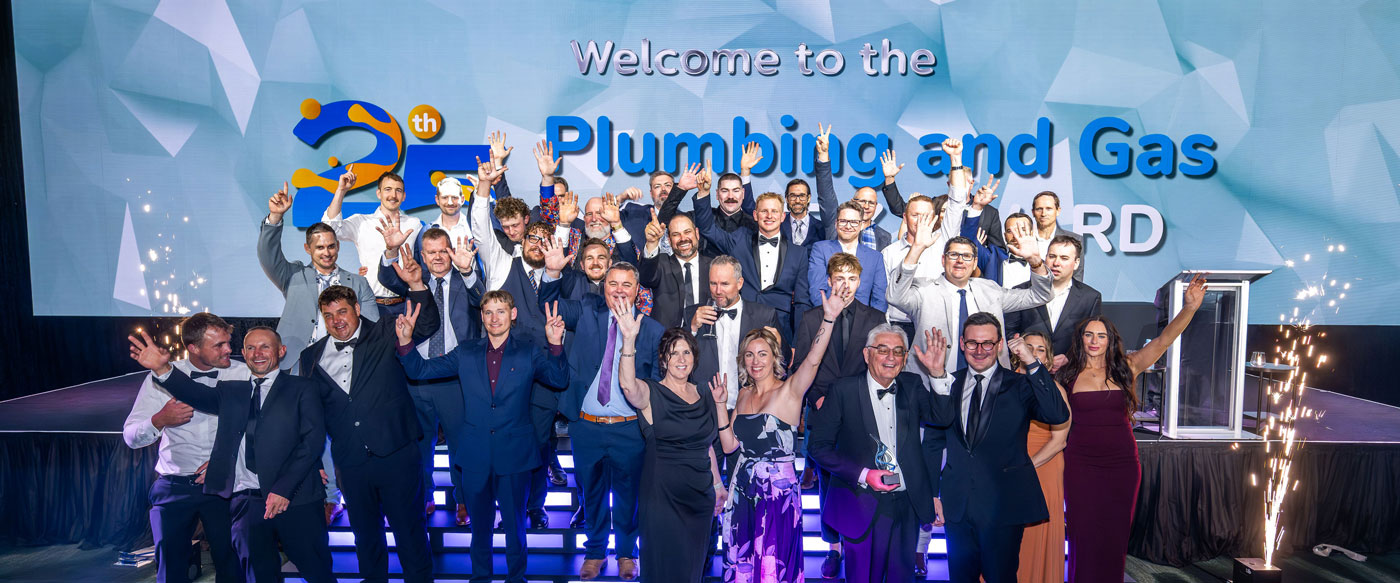
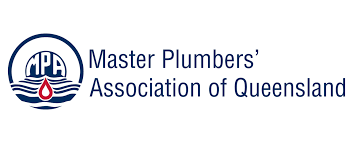 Submitted by the Master Plumbers’ Association of Queensland (MPAQ) – Australia
Submitted by the Master Plumbers’ Association of Queensland (MPAQ) – Australia
On Friday, 3 October, the 2025 Plumbing and Gas Industry Awards celebrated the apprentices, tradespeople, businesses, and industry professionals who set the benchmark for excellence in plumbing, gas, and hydraulic consultancy.
Presented by MPAQ in partnership with Reliance Worldwide Corporation (RWC), the ceremony honoured outstanding individuals and teams who delivered exceptional work to their customers.
The event brought together more than 700 people from across the industry at The Star Brisbane, including industry leaders, organisations, and emerging talent.
Across 16 different categories, 113 nominees, finalists and winners were recognised for their outstanding work.
MPAQ CEO Penny Cornah said the awards are a chance to celebrate excellence across the state, with this year marking its 25th anniversary.
“It is a significant milestone in recognising the outstanding achievements of individuals and organisations who exemplify professionalism and commitment in protecting the health and safety of our communities,” Penny said.
“Every nominee, and especially our distinguished finalists, should take great pride in their accomplishments. These awards are a symbol of the dedication and high standards that define our industry.”
Click here for the full list of winners: https://plumbingandgasawards.com/2025/10/03/queensland-plumbing-and-gas-industry-awards-celebrates-25th-year-of-dedication-and-innovation/
Singapore Strengthens Industrial Wastewater Management
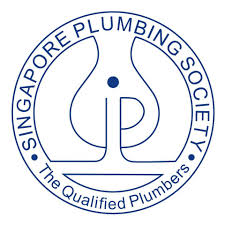 Submitted by the Singapore Plumbing Society
Submitted by the Singapore Plumbing Society
Singapore continues to advance its commitment to sustainable water management with new developments in the treatment of industrial wastewater a growing challenge in modern, high-tech economies.
As manufacturing processes evolve, the complexity and toxicity of industrial effluents have increased significantly. This has required more sophisticated treatment methods and tighter regulation to ensure public health and environmental safety.
In response, Singapore’s national water agency has expanded its capabilities through specialized facilities such as the Evo Special Waste Management plant, designed to treat chemically complex and high-strength wastewater streams. These facilities employ advanced technologies to separate, neutralize, and safely process industrial by-products before discharge or reuse.
To complement these downstream measures, industries are also encouraged and, in many cases, required to implement pre-treatment systems at the source. This proactive approach improves the efficiency of the national water recycling network and ensures that Singapore’s overall water loop remains safe and sustainable.
These efforts align with Singapore’s broader vision of achieving a circular water economy, where every drop is reclaimed, reused, and responsibly managed.
The Singapore Plumbing Society continues to support these national efforts by promoting professional upskilling, sustainable plumbing standards, and collaboration with public and private partners. Through these initiatives, the Society contributes to strengthening Singapore’s long-term water resilience and sharing best practices with the global plumbing community.
Call for Submissions – World Plumbing Council 2025 Scholarship
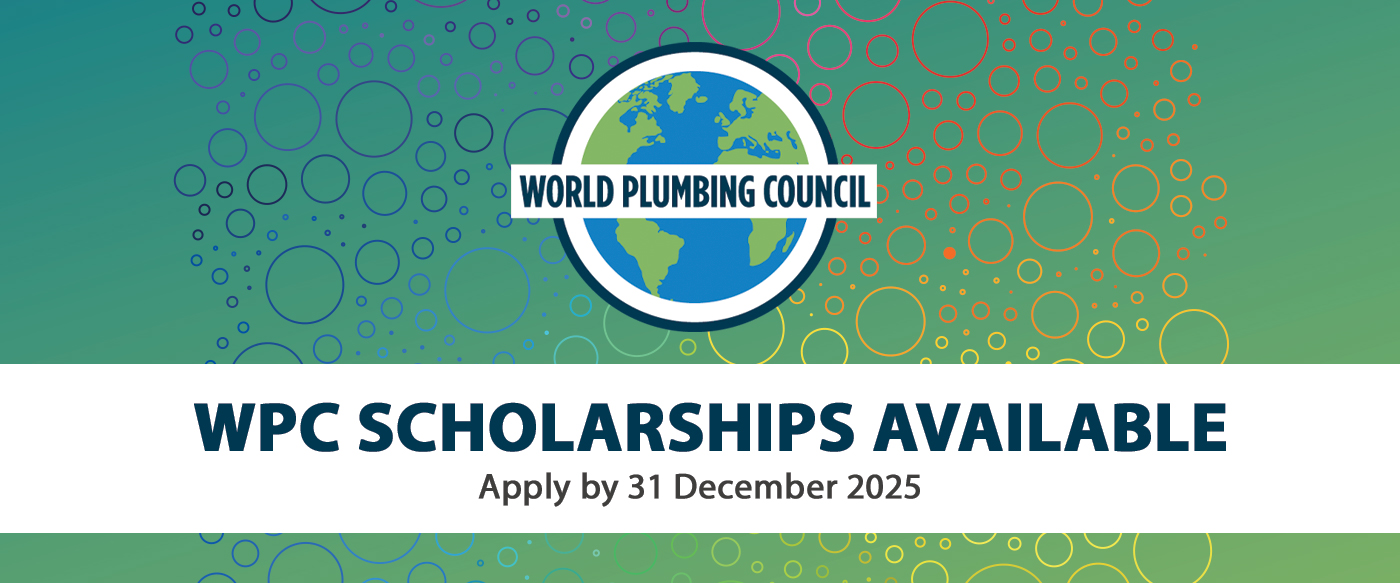
We are pleased to announce that the WPC is now accepting applications for its 2025 Scholarship Program — a unique opportunity for individuals in the plumbing industry to engage in international exchange, broaden skills, and help advance plumbing education, sustainability, and public health worldwide.
WPC offers three types of scholarships annually:
- WPC Education & Training Scholarship
- WPC Scholarship for Least Developed & Developing Countries
- WPC United Association Instructor Training Program Scholarship
All scholarships offer up to US $15,000 in funding to cover approved expenses during the program.
To apply, complete the official application form and submit it to the WPC Secretariat.
Applications must be received by 31 December 2025.
Please review the scholarship guidelines carefully, including the itinerary template and expense details template, before submitting your application.
Please feel free to forward this call for entries to colleagues, students, or professionals in your network who may benefit.
You can find more information and download application documents here: worldplumbing.org/scholarship/
Help the World Plumbing Council Grow
Do you know of an organization or individual interested in joining the WPC? Share this link (https://www.worldplumbing.org/shop/) so they can join and become part of our global plumbing community!
Dates for Diary
India Water Show (IWS)
9-10 January
Tirupur, India
indiawatershow.com
AHR 2026
2-4 February
Las Vegas, NV, USA
ahrexpo.com
IBS/KBIS 2026
17-19 February
Orlando, FL, USA
kbis.com
WQA Convention and Expo 2026
28-30 April
Miami Beach, FL, USA
convention.wqa.org/
ISH China
31 March – 2 April
Beijing, China
ishc-cihe.hk.messefrankfurt.com/beijing/en.html
World Plumbing Conference 2026 / InstallerSHOW
23–25 June
NEC Birmingham, UK
wpc2026.com
IAPMO 2025 Annual Education and Business Conference
13-17 September
Hollwood, CA, USA
iapmo.org
WaterSmart Innovations
21-23 October
Portland, OR, USA
watersmartinnovations.com
ISH 2027
15-19 March 2027
Frankfurt am Main, Germany
ish.messefrankfurt.com
Contact secretariat@worldplumbing.org to provide an event report or request listing of an upcoming event.
